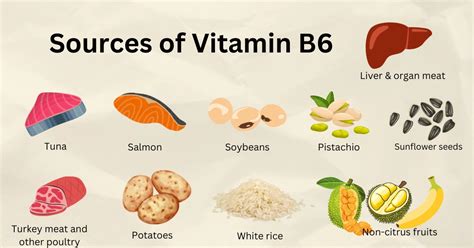Intro
Vitamin B6, also known as pyridoxine, is a vital nutrient that plays a crucial role in various bodily functions. It is a water-soluble vitamin, which means it is not stored in the body and must be consumed regularly through the diet. Vitamin B6 is essential for maintaining healthy red blood cells, nerve function, and immune system function. It also helps in the production of neurotransmitters, such as serotonin and dopamine, which regulate mood and appetite. In this article, we will delve into the numerous benefits of vitamin B6 and explore its importance in maintaining overall health.
The human body relies on vitamin B6 to perform various functions, including energy metabolism, nerve function, and immune system function. It is also involved in the synthesis of hemoglobin, which carries oxygen to different parts of the body. Vitamin B6 deficiency can lead to a range of health problems, including anemia, fatigue, and weakened immune function. On the other hand, adequate intake of vitamin B6 can help prevent these problems and promote overall health and well-being.
Vitamin B6 is found in a variety of foods, including meat, fish, poultry, whole grains, and legumes. It is also available in supplement form, which can be beneficial for individuals who are deficient or have a higher demand for this nutrient. The recommended daily intake of vitamin B6 varies based on age, sex, and other factors, but most adults need around 1.3-1.5 milligrams per day. In the following sections, we will explore the benefits of vitamin B6 in more detail and discuss its importance in maintaining optimal health.
Vitamin B6 Benefits for the Nervous System

Some of the benefits of vitamin B6 for the nervous system include:
- Reduced risk of nerve damage and neuropathy
- Improved mood and reduced symptoms of depression
- Enhanced cognitive function and memory
- Reduced risk of age-related cognitive decline
- Improved sleep quality and duration
Vitamin B6 and Neurotransmitters
Vitamin B6 is involved in the synthesis of several neurotransmitters, including serotonin, dopamine, and norepinephrine. These neurotransmitters play a crucial role in regulating mood, appetite, and sleep. Vitamin B6 deficiency can lead to impaired neurotransmitter synthesis, which can contribute to mood disorders, such as depression and anxiety.Vitamin B6 Benefits for the Immune System

Some of the benefits of vitamin B6 for the immune system include:
- Enhanced immune function and reduced risk of infections
- Improved production of white blood cells
- Reduced inflammation and oxidative stress
- Improved wound healing and tissue repair
- Reduced risk of autoimmune diseases, such as rheumatoid arthritis
Vitamin B6 and Inflammation
Vitamin B6 has anti-inflammatory properties, which can help reduce inflammation and oxidative stress in the body. Chronic inflammation is associated with various diseases, including cardiovascular disease, cancer, and neurodegenerative disorders. Vitamin B6 can help mitigate inflammation by reducing the production of pro-inflammatory cytokines and promoting the production of anti-inflammatory cytokines.Vitamin B6 Benefits for Heart Health

Some of the benefits of vitamin B6 for heart health include:
- Reduced risk of cardiovascular disease and heart attacks
- Improved blood flow and reduced blood pressure
- Reduced risk of stroke and peripheral artery disease
- Improved lipid profiles and reduced triglycerides
- Reduced risk of cardiac arrhythmias and other heart rhythm disorders
Vitamin B6 and Homocysteine
Vitamin B6 is involved in the metabolism of homocysteine, an amino acid that can contribute to the development of cardiovascular disease. Elevated homocysteine levels are associated with an increased risk of heart attacks, strokes, and peripheral artery disease. Vitamin B6 can help reduce homocysteine levels by promoting its conversion to other amino acids, such as cysteine and methionine.Vitamin B6 Benefits for Cancer Prevention

Some of the benefits of vitamin B6 for cancer prevention include:
- Reduced risk of colorectal, breast, and lung cancer
- Improved DNA synthesis and repair
- Reduced genetic mutations and cancer cell growth
- Improved immune function and reduced inflammation
- Reduced risk of cancer recurrence and metastasis
Vitamin B6 and Cancer Cell Growth
Vitamin B6 can help to prevent cancer cell growth by inhibiting the production of certain proteins that promote cell proliferation. Vitamin B6 can also help to induce apoptosis, or programmed cell death, in cancer cells, which can help to prevent tumor growth and metastasis.Vitamin B6 Food Sources

Vitamin B6 Deficiency
Vitamin B6 deficiency can occur due to a variety of factors, including a poor diet, certain medical conditions, and certain medications. Symptoms of vitamin B6 deficiency include: * Fatigue and weakness * Numbness and tingling in the hands and feet * Depression and anxiety * Weakened immune function * Poor wound healingVitamin B6 Supplements

Some of the benefits of vitamin B6 supplements include:
- Improved immune function and reduced risk of infections
- Enhanced cognitive function and memory
- Reduced risk of cardiovascular disease and heart attacks
- Improved mood and reduced symptoms of depression
- Reduced risk of certain types of cancer, such as colorectal and breast cancer
Vitamin B6 Interactions
Vitamin B6 can interact with certain medications, including: * Blood thinners, such as warfarin * Anti-depressants, such as selective serotonin reuptake inhibitors (SSRIs) * Anti-seizure medications, such as phenytoin * Cancer chemotherapy agents, such as doxorubicin * Immunosuppressants, such as cyclosporineWhat are the symptoms of vitamin B6 deficiency?
+Vitamin B6 deficiency can cause a range of symptoms, including fatigue, weakness, numbness and tingling in the hands and feet, depression, and anxiety.
What are the best food sources of vitamin B6?
+Vitamin B6 is found in a variety of foods, including meat, fish, poultry, whole grains, legumes, nuts, and seeds.
Can vitamin B6 supplements interact with medications?
+Yes, vitamin B6 supplements can interact with certain medications, including blood thinners, anti-depressants, anti-seizure medications, cancer chemotherapy agents, and immunosuppressants.
What is the recommended daily intake of vitamin B6?
+The recommended daily intake of vitamin B6 varies based on age, sex, and other factors, but most adults need around 1.3-1.5 milligrams per day.
Can vitamin B6 help prevent cancer?
+Vitamin B6 may play a role in cancer prevention by reducing the risk of certain types of cancer, such as colorectal, breast, and lung cancer.
In conclusion, vitamin B6 is a vital nutrient that plays a crucial role in various bodily functions. It is essential for maintaining healthy nerve function, immune system function, and heart health. Vitamin B6 deficiency can lead to a range of health problems, including anemia, fatigue, and weakened immune function. Adequate intake of vitamin B6 can help prevent these problems and promote overall health and well-being. If you have any questions or concerns about vitamin B6, please do not hesitate to comment below. We also encourage you to share this article with your friends and family to help spread awareness about the importance of vitamin B6.
